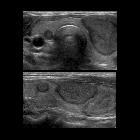Follicular thyroid adenoma

Follicular thyroid adenoma is a commonly found benign neoplasm of the thyroid consisting of differentiated follicular cells. It cannot be differentiated from follicular carcinoma on cytologic, sonographic or clinical features alone .
Epidemiology
Follicular thyroid adenoma is more commonly found in women, increases in incidence with increasing age and in regions in which the diet is iodine deficient . Follicular adenomas are encountered approximately 5 times more frequently than follicular carcinomas .
Pathology
Macroscopically follicular adenomas are round to oval, with a surrounding fibrous capsule that is usually regular and thin. They typically range in size between 1 and 3 cm, and changes including cystic degeneration, hemorrhage, ossification, calcification and fibrosis can be seen .
Functioning follicular adenomas occur as a result of a monoclonal expansion of thyroid follicular cells with a high prevalence of activating mutations in the gene for the TSH receptor . N-RAS and K-RAS mutations may be present in patients with follicular adenoma and have been implicated in the evolution of follicular adenoma to follicular carcinoma .
Subtypes
- macrofollicular thyroid adenoma
- microfollicular thyroid adenoma
Radiographic features
Ultrasound
Ultrasound features of follicular adenomas share many features with follicular carcinomas. In general follicular thyroid adenomas:
- thin peripheral halo
- predominantly cystic or mixed cystic and solid lesions
- isoechoic or predominantly anechoic
- can be homogenous or heterogeneous
- absence of internal flow or predominantly peripheral flow indicates is associated with reduced probability of thyroid follicular malignancy
Siehe auch:

 Assoziationen und Differentialdiagnosen zu follikuläres Adenom der Schilddrüse:
Assoziationen und Differentialdiagnosen zu follikuläres Adenom der Schilddrüse:

